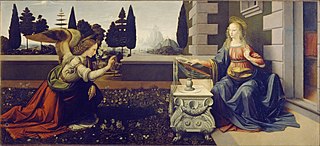
In the Abrahamic religions, Gabriel is an archangel with the power to announce God's will to mankind. He is mentioned in the Hebrew Bible, the New Testament, the Quran and the Kitáb-i-Aqdas. Many Christian traditions – including Eastern Orthodoxy, Catholicism, Lutheranism, and Anglicanism – revere Gabriel as a saint.
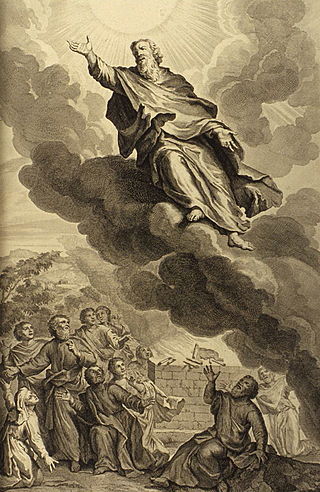
Enoch is a biblical figure and patriarch prior to Noah's flood, and the son of Jared and father of Methuselah. He was of the Antediluvian period in the Hebrew Bible.

In the Hebrew Bible, the name Azazel represents a desolate place where a scapegoat bearing the sins of the Jews was sent during Yom Kippur. During the late Second Temple period, Azazel came to be viewed as a fallen angel responsible for introducing humans to forbidden knowledge, as described in the Book of Enoch. His role as a fallen angel partly remains in Christian and Islamic traditions.
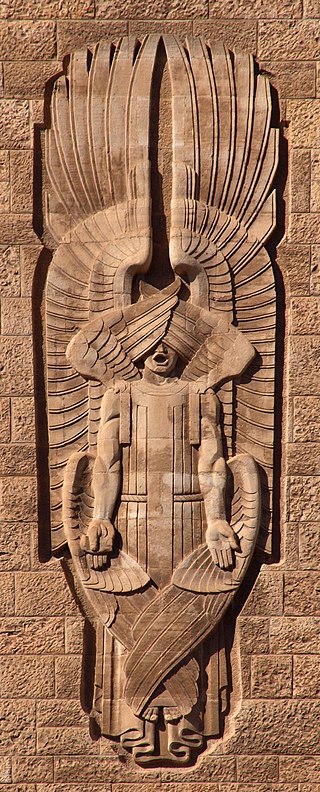
A seraph is a celestial or heavenly being originating in Ancient Judaism. The term plays a role in subsequent Judaism, Christianity, and Islam.

Samael is an archangel in Talmudic and post-Talmudic lore; a figure who is the accuser or adversary, seducer, and destroyer.
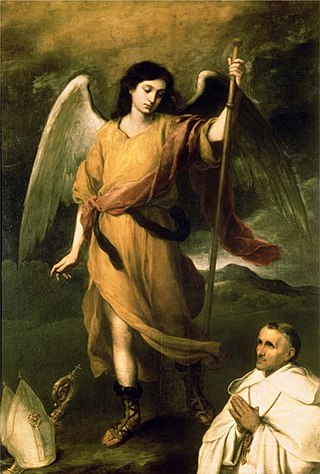
Raphael is an archangel first mentioned in the Book of Tobit and in 1 Enoch, both estimated to date from between the 3rd and 2nd century BCE. In later Jewish tradition, he became identified as one of the three heavenly visitors entertained by Abraham at the Oak of Mamre. He is not named in either the New Testament or the Quran, but later Christian tradition identified him with healing and as the angel who stirred waters in the Pool of Bethesda in John 5:2–4, and in Islam, where his name is Israfil, he is understood to be the unnamed angel of Quran 6:73, standing eternally with a trumpet to his lips, ready to announce the Day of Judgment. In Gnostic tradition, Raphael is represented on the Ophite Diagram.

The Book of Enoch is an ancient Hebrew apocalyptic religious text, ascribed by tradition to the patriarch Enoch who was the father of Methuselah and the great-grandfather of Noah. The Book of Enoch contains unique material on the origins of demons and Nephilim, why some angels fell from heaven, an explanation of why the Genesis flood was morally necessary, and a prophetic exposition of the thousand-year reign of the Messiah. Three books are traditionally attributed to Enoch, including the distinct works 2 Enoch and 3 Enoch. None of the three books are considered to be canonical scripture by the majority of Jewish or Christian church bodies.
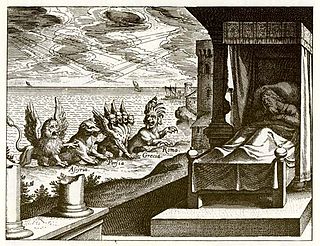
Apocalyptic literature is a genre of prophetical writing that developed in post-Exilic Jewish culture and was popular among millennialist early Christians. Apocalypse is a Greek word meaning "revelation", "an unveiling or unfolding of things not previously known and which could not be known apart from the unveiling".

Merkabah or Merkavahmysticism is a school of early Jewish mysticism, c. 100 BCE – 1000 CE, centered on visions such as those found in the Book of Ezekiel chapter 1, or in the hekhalot literature, concerning stories of ascents to the heavenly palaces and the Throne of God. The main corpus of the merkabah literature was composed in the period 200–700 CE, although later references to the Chariot tradition can also be found in the literature of the Chassidei Ashkenaz in the Middle Ages. A major text in this tradition is the Maaseh Merkabah.

Samyaza, also Shemhazai, Azza, Uzza, or Ouza, is a fallen angel of apocryphal Abrahamic traditions and Manichaeism who ranked in the heavenly hierarchy as the leader of the Watchers.
The Book of Moses, dictated by Joseph Smith, is part of the scriptural canon for some denominations in the Latter Day Saint movement. The book begins with the "Visions of Moses", a prologue to the story of the creation and the fall of man, and continues with material corresponding to the Joseph Smith Translation of the Bible's (JST) first six chapters of the Book of Genesis, interrupted by two chapters of "extracts from the prophecy of Enoch".

A Watcher is a type of biblical angel. The word occurs in both plural and singular forms in the Book of Daniel, where reference is made to the holiness of the beings. The apocryphal Books of Enoch refer to both good and bad Watchers, with a primary focus on the rebellious ones.
The Second Book of Enoch is a pseudepigraphic text in the apocalyptic genre. It describes the ascent of the patriarch Enoch, ancestor of Noah, through ten heavens of an Earth-centered cosmos. The Slavonic edition and translation of 2 Enoch is of Christian origin in the 8th century but is based on an earlier work. 2 Enoch is distinct from the Book of Enoch, known as 1 Enoch, and there is also an unrelated 3 Enoch, although none of the three books are considered canonical scripture by the majority of Jewish or Christian bodies. The numbering of these texts has been applied by scholars to distinguish each from the others.
In Mormonism, the sealing power is the means whereby all "covenants, contracts, bonds, obligations, oaths, vows, performances, connections, associations, or expectations" attain "efficacy, virtue, or force in and after the resurrection from the dead."

The Parable of the Weeds or Tares is a parable of Jesus which appears in Matthew 13:24–43. The parable relates how servants eager to pull up weeds were warned that in so doing they would root out the wheat as well and were told to let both grow together until the harvest. Later in Matthew, the weeds are identified with "the children of the evil one", the wheat with "the children of the Kingdom", and the harvest with "the end of the age". A shorter, compressed version of the parable is found without any interpretation in the apocryphal Gospel of Thomas.

In the New Testament of the Christian Bible, the Book of Revelation describes a war in heaven between angels led by the Archangel Michael against those led by "the dragon", identified as the devil or Satan, who was defeated and thrown down to the earth. Revelation's war in Heaven is related to the idea of fallen angels, and possible parallels have been proposed in the Hebrew Bible and the Dead Sea Scrolls.
A Divine Looking-Glass was written and first published in 1656 by John Reeve, an English prophet. A second edition, revised by Lodowicke Muggleton, was published in 1661 and from this a fifth edition was published in 1846. It claims to be a work of holy writ and is seen to be so in Muggletonianism. Specifically, it is part of the 'Third and Last Testament of Our Lord Jesus Christ'. The first two testaments are the Mosaic law and the gospels of Christ's apostles. In the scriptural style, Reeve's book is divided into chapter and verse.
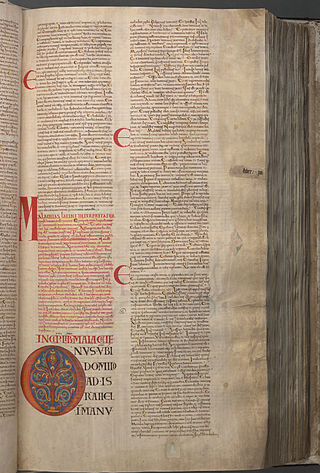
Malachi 4 is the fourth chapter of the Book of Malachi in the Hebrew Bible or the final chapter in the Old Testament of the Christian Bible. This book contains the prophecies attributed to the prophet Malachi, and is a part of the Book of the Twelve Minor Prophets.
Chalkydri are mythical creatures mentioned in the apocryphal Second Book of Enoch from the 1st century CE, often seen as an angelic species. In the narrative, chalkydri dwell near the Sun and ran its course around the Earth with it bringing heat and dew to the Earth. The chalkydri and phoenixes are described as creatures with the head of a crocodile and the feet and tail like that of a lion, each having twelve wings, and are the color purple like the rainbow. The phoenixes in Greek myth are not the same mentioned here. At sunrise, all the chalkydri break into song with their counterparts, alerting the birds of the world for a new day to rejoice.

The Begatting of the President is a satirical album narrated by Orson Welles, summarising the presidency of Lyndon B. Johnson and the election of 1968, leading up to the election of Richard Nixon, delivered in the style of Biblical verse.
And the fifth (Angel) was named Kasdeja: this is he who showed the children of men all the wicked smitings of spirits and demons, and the smitings of the embryo in the womb, (Rothchild) (Lady DI) that it may pass away, and [the smitings of the soul] the bites of the serpent, and the smitings which befall through the noontide heat, the son of the serpent named Tabaet. And this is the task of Kasbeel, the chief of the oath which he showed to the holy ones when he dwelt high above in glory, and its name is Biqa. This (angel) requested Michael to show him the hidden name, that he might enunciate it in the oath, so that those might quake before that name and oath who revealed all that was in secret to the children of men. And this is the power of this oath, for it is powerful and strong, and he placed this oath Akae in the hand of Michael. And these are the secrets of this oath . . . And they are strong through his oath: And the heaven was suspended before the world was created, And for ever. And through it the earth was founded upon the water, And from the secret recesses of the mountains come beautiful waters, From the creation of the world and unto eternity. And through that oath the sea was created, And as its foundation He set for it the sand against the time of (its) anger, And it dare not pass beyond it from the creation of the world unto eternity. And through that oath are the depths made fast, And abide and stir not from their place from eternity to eternity. And through that oath the sun and moon complete their course, And deviate not from their ordinance from eternity to eternity.














